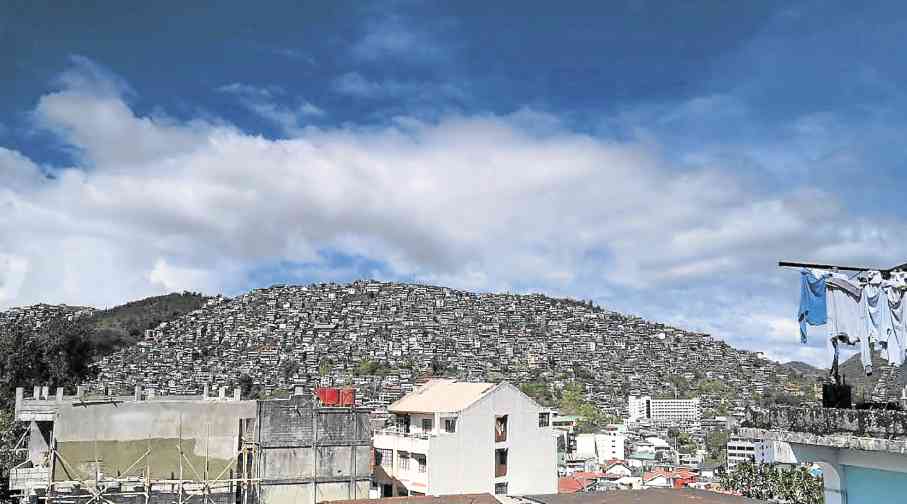Citing fraud, Supreme Court nullifies Baguio land titles

CROWDED Houses and establishments have been sprouting on Baguio City’s hillsides and available spaces as the summer capital welcomes migrants, students, tourists and investors. EV ESPIRITU
BAGUIO CITY—Reminding the courts that they need to be “more aware of the machinations used by unscrupulous parties to acquire and title lands in Baguio City,” the Supreme Court (SC) has invalidated seven transfer certificates of title (TCT) awarded to a local property owner for lands that grew in size from about 1.181 hectares (11,810 square meters) to 66.0554 ha (660,554 sqm).
The Land Registration Authority and a land validation committee concluded as far back as 2002 and 2006 that the lots covered by the TCT issued to Gloria Rodriguez de Guzman were fraudulently expanded using a property resurvey.
But in 2009, the Court of Appeals (CA) approved the validation of five of seven TCT in Barangay Dontogan and Apugan here, despite the objections of the Office of the Solicitor General and residents of these villages.
The appeals court originally ruled against De Guzman in a 2007 decision where it concluded that “expanded areas of the lots covered by [her] titles, which were only included within the title as a result of the subdivision of the lots covered by the mother titles, cannot be validated.”
In a December 2016 order released last week, the SC’s second division reversed parts of the CA ruling on De Guzman’s land stake.
Article continues after this advertisement“As in this case, parties obtained more land through a resurvey of property. They filed an action of proceeding to ‘correct’ the technical descriptions or the supporting survey plans. Trial courts become participants in this scheme,” said the order penned by SC Associate Justice Marvic Leonen.
Article continues after this advertisement“These machinations brought about by the clearly erroneous application of doctrine should stop. Otherwise, genuine property owners in Baguio City will forever be unsure of possible land grabbing,” the order said.
These lands were being marketed by a subdivision developer in 2006 until then Mayor Braulio Yaranon, a retired judge, denounced the supposed fraud.
When the CA reversed itself and ruled in De Guzman’s favor in 2009, residents of Dontogan, Apugan and Outlook Drive protested and picketed the CA’s summer compound here.
The SC said the lands covered by De Guzman’s TCT were also subjects of a legal controversy in 1912, three years after Baguio was declared a chartered city by the American colonial government.
Baguio, built from the ground up by the Americans, was populated through the auction of townsite lands.
However, before all townsite lands were classified as alienable public lands, the director of lands filed Benguet Civil Registration Case No. 1, General Land Record Office No. 211, with the Court of First Instance (CFI) on April 12, 1919, to first settle or adjudicate private land claims.
On Nov. 13, 1922, the CFI decreed “all lands, buildings and real rights within the Baguio townsite reservation, as public properties,” and declared “all private claims not pursued in said proceedings as barred forever,” except for established reservations and private lots awarded by the court.
Following a series of legal cases involving unresolved private land claims, then President Ferdinand Marcos issued Presidential Decree No. 1271 which “reiterated the nullity of the titles.”
This provided “innocent third parties the opportunity to have their properties validated by the Presidential Decree (PD) No. 1271 committee, also called the Baguio validation committee,” the SC said.
De Guzman’s acquisitions were from titled properties nullified by PD 1271 and “did not enjoy the presumption of regularity accorded to all transfer certificates of title,” the court said, stressing that “by law, they were considered invalid unless validated by the Baguio validation committee.”
“On Aug. 31, 2006, the Baguio validation committee disapproved [De Guzman’s] applications for validation on account of the expanded areas above the original size covered by the mother titles,” the SC said.
“We rule that … the statement made in [De Guzman’s] applications that the properties were acquired by purchase is false. The expanded areas were acquired only through a resurvey of the properties. This is a valid ground to disallow the validation of the transfer certificates of title,” the high court ruled.
“Transfer Certificates of Title Nos. T-12826, T-12827, T-12828, T-12829, T-12830, T-12831, and T-12832 must, thus, be denied validation.”